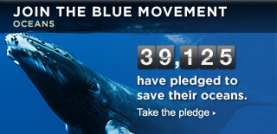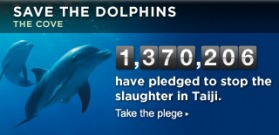|
When it comes to surfing, there is one name that dominates; Kelly Slater. Yet the nine time world champion who has recently been dubbed the number one competitive athlete across the board possesses more than the skill, grace, focus and stamina of a warrior athlete; he also shares a profound connection to his liquid arena and a deep concern for the cetacean inhabitants that reside within. I was both stoked and grateful when the often reserved Slater openly shared his reflections with me regarding the Japanese dolphin slaughter that sadly claimed yet another innocent thirteen lives earlier Monday afternoon. Spoken as a true Ocean ambassador, he writes:
"I am highly against the killings because of my affinity for oceanic creatures. I've ridden waves with countless dolphins and they are such graceful and peaceful mammals. We don't know the levels of intelligence and communications they have, we're only scratching the surface on it. I could not imagine killing something like that. "As someone who spends the majority of his time ripping perfect waves across the planet, Kelly is certainly no stranger to interacting with people's of various cultural traditions. However he makes no qualms about condemning Japan's diluted justifications for the annual dolphin slaughter and illegal commercial whaling activities, to which he refers as "a ridiculous practice and tradition." He states: "When you travel the world year 'round, you come in contact with many different cultures. You start to realize that people do things you never thought possible or necessary yet somehow make sense to them for either traditional reasons or social pressures. They are not needed as food, are potentially very unhealthy due to mercury levels, and at this point we have traversed the knowledge necessary for 'scientific purposes' of killing them.""Surfers Paddle Out", 2007 photo: Surfers for Cetaceans As part of the surfing crew that took part in the paddle out ceremony led by Dave Rastovich and Surfers for Cetaceans in 2007 that would later become a scene in the recent Academy Award winning documentary film, The Cove, I was impressed by Kelly's support of his fellow surfer's mission after lending him a copy of the film early last year. "I think it's great. Rasta's brought awareness and visibility to a lot of people around the world. The issues have been raised and can't be ignored now even more so," he told me in a follow up e-mail correspondence and even mentioned the possibility of traveling to Taiji himself to oppose the annual atrocity. Unfortunately, there is no time like the present. Earlier today, reports began flooding in from the front lines that the infamous killing coves once again shamefully ran red with cetacean blood. Up until now this year's hunting season has been substantially less active than years past, largely in part due to the collaboration of activist groups on the ground to defend the 'homeland' and from the recent outpouring of media support in Tokyo. However the fisherman of Taiji once again turned this otherwise serene coastal village into a disgraceful butcher shop as they resumed business as usual while the concerned eyes of the world continue to watch on in sheer horror and disbelief. Adds Slater: "I don't understand the need for it or the idea behind it but I do know that when the cameras are on these 'fishermen' they are not proud of the 'job' they're doing and don't want any of it to be made public. There is an inhumanity to this, as there is to war, but there is a conscience in every one of those guys who is doing it."Australian actress and passionate dolphin and whale defender Isabel Lucas, who was also part of our 2007 surfing ceremony to honor the thousands of lives lost throughout the decades and help expose this critical issue quickly chimed in when she learned of the recent reports of this year's bloodbath. She writes: It is heartbreaking to realize that the Taiji dolphin kills are still happening as we speak. Hundreds of Dolphin and whale families are being exterminated in the name of an outdated tradition and human greed. What is even harder to comprehend is that the meat is filled with heavy metal toxins and mercury poison, and is completely unfit for human consumption. We need to band together as caring human beings to end the slaughter, and protect humans from poisoned meat. I urge everyone to put pressure on the Japanese government to end this practise, and to support direct action groups such as Sea Shepherd and Save Japan Dolphins. According to Sea Shepherd Conservation Society Founder, Paul Watson, "The sea teaches us so much and it is the responsibility of surfers to communicate these teachings to humanity." In a previous interview conducted for Surfer Magazine, he further encouraged surfers to take a more active role in the protection of the world's oceans and all the marine life that reside within. He eloquently states: "Listen to the ocean, listen to the whispers in the waves and surf where your heart leads you, let the ocean speak through you and do everything within your power to protect her majesty the sea from the ignorance and arrogance of humanity. Kelly has said that the ocean has spoken to him as it has spoken to me and many others. He understands what it means to be a moanahepara -- a shepherd of the sea."Captain Paul Waton and Kelly Slater at Australian Quicksilver Pro, 2007. photo: Deborah Bassett Slater, a long time supporter of Sea Shepherd further adds: "I believe the dolphin killings are a chance for everyone to sit back and become aware of what impact their lives have on the world around them. I hope for change in a lot of things happening in my own life and in the world around me and this one is at the top. Hopefully, with enough visibility and education to the people involved, there can be a complete stop to this ridiculous practice/tradition."WHAT YOU CAN DOJoin the October 14th Annual Save Japan Dolphins demonstration in a town near you. Sign the petition at Take Part. 2 million people and growing strong. Watch the celebrity PSA here. Join the Visual Petition, an ongoing action campaign from Surfers for Cetaceans and Minds in the Waterwith over 10,000 participants including Kelly Slater and numerous other surfers and celebrity activists and concerned citizens from around the world. Check the Sea Shepherd website for up to date information from the "Cove Guardians" on the daily happenings in Taiji. Watch The Cove. Spread the word. Pass it On. Call and write your local Japanese Embassy to voice your concerns on the issues. Photo Courtesy: Noah Schutz Peaceful Warrior Ric O'Barry Speaks Out on Taiji Dolphin Slaughters- Huffington Post 9/7/102/15/2011 Environmentalists and animal rights activists around the world have been sitting on pins and needles this past week as the annual dolphin hunt that claims more than 20,000 innocent cetacean lives every year kicked off in the coastal village of Taiji, Japan on September 1st. No one is more familiar with the on-going battle to end these senseless slaughters better than Ric O'Barry. The 70-year-old former Flipper trainer turned dolphin activist and star of the recent Academy Award-winning film, The Cove, has been at the forefront of the struggle to put an end to this brutal atrocity for over four decades. Per usual, he is back on the ground campaigning with his team from Save Japan Dolphins, a long standing initiative of Earth Island Institute. However due to escalated threats of violence by right wing extremists groups, this year he finds himself rallying media support in Tokyo, rather than staking out the "little town with a big secret" that has long been the singular focus of his personal mission and life's work.
On September 2, the day after the hunts were set to begin, O'Barry and an international conglomerate of concerned citizens, delivered a petition with over 1.7 million signatures representing 155 nations to the U.S. embassy in Tokyo. "We have come to ask President Obama to get involved in this issue and ask the Japanese government to abolish this annual, anachronistic, brutal slaughter of dolphins," stated O'Barry in a recent press release. The U.S. president is expected to visit Japan in November for an annual summit of Asia-Pacific leaders. I had both the honor and privilege of working directly in the field with Ric O'Barry back in 2007 during a surfing paddle out ceremony led by Surfers for Cetaceans in conjunction with The Oceanic Preservation Society's covert filming operation of The Cove. Earlier this week, O'Barry candidly shared with me his thoughts on the current happenings in Japan in what he calls a "media blackout of the issue up until now." He states: "We have virtually every media outlet at our disposal and because of that we are reaching millions of people around the world. We have turned up the heat in Japan and turned another corner in getting positive media coverage, thwarting Japan Fisheries Agency efforts to paint us as imperialists and outsiders just bashing Japanese people. Instead, millions of people in Japan are now hearing, most for the first time, about the dolphin slaughter, precisely what the Japan Fisheries Agency has successfully covered up in this country for decades." While O'Barry and his team had initially intended to head back to the scene of the grueling bloodbath, as evidenced by the undercover footage exposed in The Cove, they decided to cancel that portion of the trip due to heavy threats from right wing pro-whaling groups within Japan. Mark Palmer, director of The Save Japan Dolphins campaign, explained in a recent e-mail correspondence: "We are not here to do confrontations with mobs; we are here to educate the people of Japan and help them overturn really bad government policy on allowing dolphins to be slaughtered and sold in markets despite the dangers of poisoning from mercury contamination." With various conflicting reports flooding in all over social media sites as to the current situation on the ground both in Tokyo and Taiji, O'barry helped to set the record straight. He reported on Saturday: "We have had 14 people on the ground for the last several days in Taiji. It is ghost town there at moment. The only bodies visible are the 11 police officers from Shingu, Kii-Katsuura, and Wakayama City. The right wing militants have abandoned the issue." Although it has been confirmed that the "hunt" is indeed under way, fishing boats boats returned empty earlier in the week. On Sunday morning, an unidentified activist from the group, Oceanic Defense, statedon their blog site the following information: "For two days now we have traveled to that Cove, and seen nothing, only to be told hours later dolphins are being held there. Yet, when we arrive, they are gone again. It's almost as though the fishermen know our movements before we do. It's frustrating to think we've traveled all this way and can do nothing to stop the bloody slaughter that happens here." Meanwhile an official from the town of Taiji released a statement to the Associated Press on opening day of the hunt, stating that "I have no idea what the foreigners' intentions are, but there is nothing unusual going on in the town. Our stance remains the same. The town will continue hunting dolphins no matter what they say." On Thursday, Japanese media reported fishermen in Taiji had captured 20 bottlenose dolphins in the secluded cove as the first catch of the season, however local fisherman would not confirm the reports to the Associated Press. "We don't want to be reported on by foreign media," he said. "This is what we do for a living. We are worn out because of the row over The Cove." According to director of The Cove, Louie Psihoyos, in a recent personal correspondence: "The mayor of Taiji celebrated the taking of 10 dolphins today. Knowing that the world was watching, the dolphin hunters selected several dolphins for marine parks and set the remaining pod members back into the wild. Last year, those dolphins would have been butchered and much of their poisoned meat sold as 'whale' meat to unsuspecting consumers. It's important that we keep vigilant -- this kind of evil cannot stand the light of day." O'Barry is quick to point out that it is not the townspeople of Taiji, but rather 26 fisherman responsible for the dolphin killings. In response to the call for a boycott from various activist groups, O'Barry told theJapan Times on Sunday that he reversely would like to "anti-boycott Japan." On the contrary, "We want people to go to Taiji, go to souvenir shops and restaurants and spend money to stimulate the economy there," noting that this approach would give the town alternative sources of revenue to selling dolphin meat." Some critics have questioned why O'Barry, certainly no stranger to risking his life continously through his dedicated activism, has not forged on with a mission to the Taiji. O'Barry responded: "The first part of our mission is to make the world aware that the annual dolphin slaughter has begun once again and to that end we have been very successful. The media is based here in Tokyo, not in Taiji. It is very difficult to get the media to travel to the remote location of Wakayama prefecture and there is really very little that we can do there. This is not a 'one size fits all' scenario and confrontation does not work here. You have to stay in the game and we are here to stay in the game until we win it." O'Barry further encourages a peaceful non-violent solution to the ordeal. "In order to effect positive change, we have to win the hearts and minds of people," he adds. "We accomplished this recently in the Solomon islands after 450 years of "tradition" -- so this strategy is clearly working." Regarding his steadfast, peaceful warrior approach to the situation, he boldly admits: "I know exactly where the 13 dolphin hunting boats are moored. I know how to sink them without being detected. And if I believed that sinking the boats would end the dolphin slaughter, I would have already done it. But it won't work. It would only work against us. Having worked on this issue for so long, I know that the Japanese media would frame the story in such a way that the 'poor fisherman' would be the victim of terrorists. The government would buy them new boats and they would be hero's. Those of us who are working inside Japan would be banned from Taiji forever." At present, O'Barry has confirmed that no dolphins have actually been slaughtered and that the fisherman have even released a pod of mothers and babies back into the wild after selecting an "attractive" few to be sold into a dreadful life of captivity via the dolphin slave trade. However, O'Barry cautions that once the cameras and protestors are gone, "business as usual" will likely resume and the fate of the dolphins will be left in the hands of the those that are willing to stay the course: "When we arrived in Taiji last September, the dolphin hunters released about 80 bottlenose dolphin after selecting several "show quality dolphin" for various zoos and aquariums. They went on to kill all other species after we left the area. It seems to me that they will do the same thing this year." While the updates continue to trickle in from those behind 'enemy' lines, it appears that the combined efforts of activist groups and passionate individuals around the world have been collectively victorious in sending a clear message to the Japanese government that the world wide community is indeed watching very carefully and that is perhaps the first step in bringing an end to the outdated, if not barbaric, practice that hides under the false guise of cultural tradition. Added Psihoyos in a recent article for Malibu Magazine's "Blue" edition: "Slavery and not allowing women to vote were once considered traditions in America, however when human rights are violated, traditions can no longer be allowed to continue. In this case, the 'tradition' is a myth perpetrated by the few that benefit from the sale of captive dolphins and a cover-up to prevent the truth about the dolphin meat that is poisoning the masses." If enough people around the world learn about this "barbaric dolphin slaughter", O'Barry is hopeful that they will take action. He writes: "We have reports from all over the world that the Japanese embassies and consulate offices are being bombarded with messages to stop the dolphin slaughter. Now we need to flood the World Association of Zoos and Aquariums (WAZA) with a message to start policing their own industry. The Taiji Whale Museum (TWM) is directly involved in these captures. TWM is a member in good standing of theJapanese Association of Zoos and Aquariums (JAZA). JAZA is a direct member of WAZA.O'Barry urges individuals and organizations to "send WAZA a strong message to expel all JAZA members -- especially the TWM -- for violating the WAZA code of ethics." O'Barry is currently on his way to address members of the Foreign Correspondents Club of Japan, of which he remains an honorary member in good standing. His new series, Blood Dolphins, directed by his son and fellow dolphin activist, Lincoln O'Barry, airs on Friday evenings at 9pm on Animal Planet. For up to date information on the situation in Taiji and to learn how you may take action to help stop the slaughter, please visit: www.savejapandolphins.org Photo courtesy: Animal Planet Faroe Islands Pilot Whale Massacre Exposed by Undercover Activist- Huffington Post, 7/29/102/15/2011 While Japan may be in the hot seat with the international community for it's annual Flipper killing-spree, recently exposed by this year's Academy Award winning film The Cove, it is certainly not the only nation guilty of gruesome cetacean massacre. Last week, The Sea Shepherd Conservation Society captured shocking and highly disturbing images of 236 pilot whales brutally slaughtered in the town of Klaksvik in the Danish Faroe Islands. Ah yes, something is indeed very rotten in Denmark.
Living incognito and posing as a Swedish film student under the alias Frederik Nilsson, Sea Shepherd's Peter Hammarstedt was alerted to the annual "grind," as referred to by the Faroese, by a broadcast over the local radio station. Without hesitation, the veteran activist quickly arrived on the scene to document the grisly bloodbath that is considered a cultural tradition and rite of passage in the tiny island group situated approximately halfway between Britain and Iceland. Hammarstedt, a Swedish native, offered his first hand knowledge on the matter earlier this week and recounted the harrowing experience that left him fleeing the seaside village once his true identity was discovered and he began to receive threats and was followed by local fisherman who recognized him for his prominent role on the hit television series, Whale Wars. "An entire pod that once swam freely through the North Atlantic has been exterminated in a single blood bath," stated Hammarstedt on the Sea Shepherd website. "Unborn babies still attached to their mothers by the umbilical chord had been cut out of their mother's dead bodies and left to rot on the docks," added Hammarstedt, who photographed several dead pregnant females, infants and fetuses. "Pilot whale groups are strongly matriarchal; I can't imagine the fear and panic that these mothers must have felt as their families were wiped out in front of them." While, there is no such thing as a pretty picture when it comes to the topic of whaling, this particular "method" is especially gruesome as is harshly evidenced by the grueling photos taken by Hammarstedt in order to expose the sheer cruelty behind the killings. This horrendous tradition, if not blatant act of 21st century barbarism, involves stranding and capturing pods of pilot whales and violently cutting out their spinal chords with long knives while simultaneously bludgeoning them to death with stones, spears, hatchets, clubs and axes. All the while young village children frolic in the shallow bloody waters and participate in the butchery of the visibly and audibly terrified whales in what is considered by locals as a community sporting event. According to Hammarstedt, "Among the male population, it is a coming of age ritual as a boy is allowed to partake in the actual killing when he becomes a teenager." While the grim images speak for themselves, Hammarstedt described the massacre of one of the grind's innocent victims in detail: "One whale had five to six brutal chops to her head. The islanders basically used her as a chopping board. Her death would have been slow and extremely painful. Some whales are hacked repeatedly for up to four minutes before they finally die." While there is some local criticism of the grind amongst villagers, most are reluctant to voice their opposition as cultural tradition runs deep in the small tight nit community of Norse descendants. Furthermore, townspeople are expected to participate in the bloody "festivities" that have taken place since the 1500s against the pristine fairy tale like back drop. According to Hammarstedt: After the Klaksvik grind, several eyewitnesses criticized the grind to the media but all chose to remain anonymous. The Klaksvik grind was particularly cruel because the number of whales taken far exceed the carrying capacity of the shore. Since the whole community partakes in the grind, critical voices are rare. Although listed as "strictly protected" under the Convention on the Conservation of European Wildlife and Natural Habitats, also known as The Berne Convention, pilot whales in the Faroes Islands are anything but that. According to Sea Shepherd founder and lifelong champion of all whales and dolphins, Paul Watson, who referred to the Faroes as "The Ferocious Isles" in a recent email correspondence: "The killing of the whales in the Faroe Islands is a violation of the European Union, specifically the Berne Convention but the Faroes as a Danish Protectorate are not a member of the EU although they directly benefit through Denmark from the EU. Denmark should be held accountable but apparently they are not.While there is a little bit of grey area, added Hammarstedt, the Convention states clearly that, "all signatories are responsible for co-ordinating their efforts for the protection of migratory species specified in Appendices II and III whose range extends into their territories. Long-finned pilot whales are classified under Appendix II and the Faroe Islands are a territory of Denmark. The Faroes have so-called "home rule", but Denmark is responsible for Faroese foreign policy." Furthermore, The international Whaling Commission, the only supposed regulatory governing body of worldwide whaling practices, does not recognize small cetaceans such as the pilot whale, which contrary to it's name is actually a member of the dolphin family. Just like it's cousin in Taiji, these sentient and intelligent marine mammals literally have zero legal representation in the international conservation arena, leaving it largely up to direct action environmental organizations such as Sea Shepherd to take it upon themselves and risk personal safety by bravely exposing these issues. "I have sent expeditions there to oppose the slaughter in 1983, 1985, 1986 and 2000. In 1986 we worked with the BBC to make the documentary film Black Harvest," added Watson. The Faroes, whose fisheries products account for more than 95% of total exports, have historically relied upon the fishing industry as a primary food source, however current scientific research indicates that the levels of mercury found in cetaceans such as the pilot whale are toxic and dangerous for human consumption. However, "The Faroe Islands now have one of the highest standards of living in Europe and the grind is no longer necessary for subsistence," explained Hammarstedt. Furthermore, he added: "Since a health advisory was put out in 2008 by the Faroese chief medical officer Paul Weihe, less pilot whale meat is consumed because of the high contents of heavy metal pollutants. So the grind continues to a large part because of cultural tradition." When asked what people could do to become actively involved in bringing an end to the senseless thrill kills, Hammarstedt suggested hitting the Faroese in their wallets, a tactic not at all unfamiliar to Captain Paul Watson and Sea Shepherd who are well known for their successful efforts to bankrupt rogue maritime industries including the collapsing Canadian seal hunt and illegal Japanese commercial whaling. Noted Hammarstedt: Forty thousand people visit the Faroes as tourists every year. There is huge potential for the tourism industry to grow. Iceland gets over half a million tourists a year. It's a shame for Faroese business that when you do a Google search for the Faroe Islands, images of dolphin slaughter are the first to come up. I would contact the Faroes Tourism Board and state that you won't travel there until the grind is stopped.For more information on the grind, visit: www.seashepherd.org or contact the Tourism Board directly: Samvit - Faroe Islands Enterprise Bryggjubakki 12, P.O.Box 118 FO-110 Tórshavn, Tel. 306900, Fax 306901 [email protected], www.tourist.fo www.visit-faroeislands.com, www.samvit.fo ALL PHOTOS COURTESY: SEA SHEPHERD/Peter Hammarstedt Above photo: "Jackie: Isolated in Captivity at The Bali Zoo" Deborah Bassett
An international stakeholders conference organized by the Indonesian Forestry Ministry, entitled, Man of the Forest: Orangutan and the Future of Humanity, was held July 15-16 at a posh local resort off the eastern coast of Bali. Government officials from Indonesia and Malaysia and corporate executives of palm oil plantations, pulp and paper and mining companies operating in orangutan habitats across Sumatra and Borneo met to determine a course of action for the future of orangutan "conservation" at the USAID supported event. They were joined by a conglomerate of dedicated NGO and non-profits including a small delegation of direct action environmental and animal rights activists who showed up on behalf of the real stakeholders, the orangutans. "Everyone wants to talk about statistics and research, and believe that we are achieving success, but the situation is worse now than ever and no one wants to address the real issues. The orangutans are losing." said Hardi Baktiantoro, Director of COP, The Center of Orangutan Protection, during a press conference held in a sparsely filled room adjacent to the main conference. The third largest forest nation with 120 million hectares, Indonesia is subsequently the world's third largest carbon polluter and loses more than 1 million hectares per year due to illegal logging, illicit land clearing and forest fires. About 90 percent of orangutans live in Indonesia, between Sumatra and Borneo islands, while the remaining 10 percent can be found in Sabah and Sarawak, Malaysia. Both species of orangutans have been place on the red list of The International Union for the Conservation of Nature(IUCN) with The Sumatran species listed as critically endangered. According to the Ministry of Forestry's own findings, an estimated 100,000 wild orangutans have fallen innocent victim to the chainsaw powered by corporate greed or have been sold into captivity since 1970. "On paper, orangutans are one of the most "protected" species in the world, yet this is not the case even in so called "protected" areas," added Baktiantoro who has rescued over 300 orangutans in his lifetime from the most destitute of situations. "I have seen orangutans beaten with wooden sticks and many with crushed skulls," he added as he presented a slide show of both heart wrenching and infuriating photo evidence. "Right information leads to right action and therefore our aim is to investigate and expose crimes against orangutans through photo and video documentary."The grim reality is that orangutans are dying at unprecedented rates due to rapid deforestation caused directly by palm oil and logging companies. To worsen matters, The Forest Ministry, which is the very entity responsible for enforcing existing conservation law, is directly profiting by selling "licenses" to these corporate outlaws who are destroying critical habitat at exhausting rates and brutally taking down these undeserving and innocent victims in the process. Typically, the companies responsible for "clearing" the forest hire hunters to slaughter the remaining orangutans who have not already been burned to death during the fires or killed by falling from their treetop homes while being hunted for bushmeat. More often than not, orphaned babies are taken and later sold as illegal pets or into torturous conditions to local "zoos" that resemble primate prison camps. Or they are illegally funneled into the international black market where they are left at the mercy of middlemen until they reach their final owners as far away as the Middle East or Europe. A symbol of status both locally and throughout many Asian cultures, owning an "exotic" species is quite commonplace even though orangutans in Sumatra and Kalimantan (Indonesian Borneo) have been listed in appendix I of theConvention on International Trade Endangered Species (CITES), which in theory makes their trade and possession illegal accept under "special circumstances." In some cases, orangutans are simply abandoned to survive with what very little is left of their once lush and abundant surroundings. In such situations, they do not survive long. Other times rescue workers from NGOs such as COP or Orangutan Outreach have the grueling task of recovering them from more severe conditions such as crippling cages where they have been left chained, confined and malnourished for the remainder of their short lives. Under normal conditions, orangutans can easily live into their 50s. Richard Zimmerman, founder of NYC-based non-profit Orangutan Outreach, was at the conference last week after returning from a rescue mission in West Kalimantan, where he and his team are in the process of building a critically needed rehabilitation center in the remote city of Sintang. According to Zimmerman: "The situation facing orangutans in the wild is nothing short of genocide, and West Kalimantan is the new Ground Zero in the fight to save these gentle intelligent creatures. For too long the orangutans in this remote Indonesian province have been left to defend themselves, and the result has been catastrophic. But now, through cooperation with the Indonesian Ministry of Forestry and other local stakeholders, we are giving these orangutans a fighting chance."However the work is not easy, or cheap. Zimmerman added: "These rescue operations cost money, and we are depending on our donors' support to help us keep going. In order to build a successful rehabilitation program for orangutans, it is absolutely critical that we have sustained support both locally on the ground and financially from abroad. The economic crisis has not been kind to small non profits like Orangutan Outreach, but we have to keep going. Otherwise, the orangutans will be wiped out." At the 2007 Bali climate change conference, President Susilo Bambang Yudhoyono announced conservation strategies aimed at stabilizing the habitat and populations of both the Sumatran and Bornean subspecies by 2017, as well as the release of all captive orangutans back into the wild by 2015 through a rehabilitation program. Yet those who work directly in the field such as Bungaran Saragih, Chairman of the Board of Trustees of the Borneo Orangutan Survival foundation (BOS), point to the severe lack of progress on either initiative."First, there are still no visible signs of stabilization of orangutan habitats or their populations," he said. "Second, the rehabilitation target is still far out of reach, because in the three years since the plan was announced, we haven't seen a single individual released back into the wild." According to Bungaran, locating large, undisturbed areas of forest, suitable to accommodate the released orangutans is a major part of the problem, "At BOS, we have around 850 orangutans in rehabilitation centers, but we can't release them precisely because of this problem," he said. Recent studies indicate that this highly sophisticated species whose DNA is 97 percent similar to homo sapiens will be the first great ape to become extinct if urgent action is not immediately taken. Currently, approximately 7,000 Sumatran orangutans still exist in the wild, while an estimated 45,000 remain on Borneo. Orangutans play a crucial role in regulating the natural health of the forest by dispersing seeds and opening the forest canopy allowing sunlight to nourish the soil. Their absence would carry a devastating "trickle down" effect upon the entire delicate eco-system.With tens of millions of dollars of foreign aid investment over the past three decades and a recent billion dollar backing by Norway for Indonesia to curb greenhouse gas emissions by reducing deforestation, it may be up to international entities to apply serious pressure to the Indonesian government to choose conservation over corruption. Otherwise, perhaps The Hague would be a more appropriate venue for future "stakeholder" meetings. According to Gary Shapiro, co-founder of Oran Utan Republik and the first person to successfully teach sign language to free-ranging, ex-captive orangutans, the responsibility also lies with the local populations to protect their homeland and the intricate web of species that reside within it."By building a capacity of young people through education in conservation, we are here in a supportive role and continue to encourage that Indigenous Indonesians be willing to demand more from their government." Added Shapiro, " I have been coming here since the 1970's. The most important word to learn in Indonesian is sabar. It means patience" Unfortunately, patience is something that these gentle forest dwellers may not be able to afford much longer. Every minute, an area of forest the size of ten football fields is lost in Indonesia with wild orangutans disappearing at a rate of 2,000 per year. In a 2007 United Nations report, "The Last Stand of the Orangutan: State of Emergency," orangutans were given a sentence of 5 years before extinction in the wild. Unless there is an immediate turn around and a shared responsibility to diligently address this government sanctioned annihilation, the collective human family may be responsible for banishing our closest living relatives from the Earth forever. To learn more about the crisis facing the orangutans and see what YOU can do help, please visit the Orangutan Outreach website: http://redapes.org Follow Deborah Bassett on Twitter: www.twitter.com/debstact "Media That Inspires" is an ongoing conversation at TakePart that recognizes the power that films, books, and other media have to compel change and prompt action. TakePart is asking people who make a difference every day about the works that have inspired them.
Q: Which film or book was a wake-up call and made you truly aware of an issue? DB: I am a firm believer that all of the creative arts and media that children are exposed to during childhood can plant seeds of inspiration and ultimately have an impact on one's path. The film that made a lasting impression on me during those pivotal years was Gorillas in the Mist, the real-life story of Dr. Dian Fossey and her struggle to save the last endangered mountain gorillas of Rwanda's Virunga National Park from extinction due to illegal poaching, which ultimately resulted in her tragic murder. While some may consider the content a bit heavy for an 11-year-old, it not only opened my eyes to how intelligent and gentle these fellow inhabitants of the Earth are, it also told the story of a passionate woman who was courageous enough to stand up for her innocent and powerless friends. The film also introduced me to the concept of human-caused extinction, and to be honest, I am as uncomfortable with that notion today as I was 20 years ago! This film is a wonderful tribute to Dr. Fossey's mission, and I would certainly encourage activists of all ages to see it or read the book Woman in the Mists: The Story of Dian Fossey and the Mountain Gorillas of Africa, written by the great Canadian environmentalist Farley Mowat. Q: Which film or book inspired you to take action and get involved in an issue? DB: Shannon Keith's latest film, Skin Trade, really lifted the veil for me on how much suffering still exists today for something so unnecessary and narcissistic as fur! As a long-time campaigner against the Canadian seal hunt and a vegetarian for over 20 years, I was quite shocked about how little I knew about the barbaric industry as a whole, and what other animals still fall victim to its brutality. Although the subject matter and imagery is difficult to stomach at times, through undercover investigation by Keith and other dedicated activists, the film diligently illustrates how misleading this industry is to the consumer public. The very next day I found myself on the phone with the president of the Fur Council of Canada engaged in a debate over the government-sponsored "Fur is Green" campaign which is also brought to attention in the film. Joe Berlinger's Crude is also a must-see documentary that investigates the toxic legacy left by Chevron in the heart of the Ecuadorian rainforest. Given the recent disaster in the Gulf of Mexico, now, more than ever, everyone should make it a point to see this film that exposes the devastation that indigenous groups in the Amazon have been dealing with for over 30 years due to blatant oil contamination caused by corporate negligence. Q: Is there a book or film out right now that particularly inspires you? DB: This year's Oscar-winning documentary film The Cove. Brilliantly directed by Louie Psihoyos, the film covers the complex issues of the annual dolphin slaughters that take place each year in the coastal waters of Japan. I feel a very intimate connection to this particular documentary as I participated in the 2007 surfing paddle-out ceremony in the notorious "killing cove" of Taiji in order to oppose the brutal killings—a scene that would later become part of the film. During this time, I met former Flipper trainer turned dolphin warrior, Ric O'Barry, and the OPS crew who were covertly on location filming and acquiring the footage that would ultimately lead to the exposure of this town's bloody secret and also reveal the serious dangers surrounding mercury poisoning. Q: What is your favorite escape and guilty pleasure? DB: Favorite escape: Without wishing to come off as overly "new age," I find the best escape is nothing more than becoming completely present in the moment, and nothing gets me into that zone better than a good surf session. When I am in the ocean, all thoughts seem to melt away and I am left contently connected with my immediate surroundings. It's even better when whales, dolphins and sea turtles present themselves. That is when I feel my ultimate bliss! Of course, a deep yoga session is also a direct way for me to access that place of pure inner peace. Intimate connection with one's own breath is perhaps the most powerful tool that humans have and yet many people pass their entire lives without ever experiencing it. Lately I've been experimenting with "Tibetan Bowl" meditations here in Bali and that takes it to the next level! I would highly encourage everyone try it at least once in their lives. Guilty Pleasure: American Idol and my love for really bad '80s music, the more obscure the better. While ocean conservationists may be breathing a bit easier since last month's decision by the International Whaling Commission (IWC) to uphold the 24-year-old ban on commercial whaling in Agadir, Morocco, another monumental "win" for the cetacean family came this past weekend in movie theaters throughout Tokyo. After several months of delays and protests by radical nationalist groups, the long-awaited release of the Oscar award winning film, The Cove, premiered in six sold out cinemas across the Japanese capital on Saturday. Another 18 theaters are set to begin screening the controversial film that exposes the slaughters that claim the lives of over 20,000 dolphins and porpoises off the coastal waters of Japan each year.
The film, directed by Oceanic Preservation Society (OPS) founder, Louis Psihoyos tells the gripping story of former Flipper trainer turned Dolphin Warrior, Ric O'Barry's relentless 30-year personal mission to shut down the notorious killing cove forever. Resembling more of a special operations task force than a documentary film team, the OPS crew risked certain arrest and personal danger throughout their covert missions to acquire the footage necessary to reveal the truth behind what O'Barry refers to in the opening scene as "a small town with a big secret." Psihoyos took the time to explain to me the significance of the film's screening within Japan via e-mail from Polynesia where he and his team are already engaged in their next ocean conservation related film project. He writes: "Two years ago people said The Cove would never be seen in Japan. Now, it is selling out theaters there and nearly everyone there seems to know about the film. I'm hopeful that once people in Japan see the movie they will understand that it is not just a movie about saving dolphins but also humans, because all dolphin meat is toxic from what we humans are dumping into the oceans." While the film continues to come under attack from critics within Japan as being a one sided account of the issue as seen through the lens of western bias, Psihoyos is quick to also point out, "This is not just a Japanese problem but a worldwide problem. The bigger issue is that we humans are poisoning the oceans not only for the wild, but for ourselves and future generations." The film, which covers in depth the topic of mercury contamination, was instrumental in influencing the removal of dolphin meat from the government sanctioned school lunch program that was serving up the toxic cetaceans to Japanese youth. Ric O'Barry also spoke candidly to me this week via Skype and e-mail, stating that: "My hope is to get The Cove in front of the 126 million people who have not seen the movie and thus have no clue what is going on. Getting the movie shown inside Japan will move some of the viewers into action. At least the consumers of dolphin meat will stop buying the mercury tainted product." Three theaters canceled planned screenings last month after several protests and an aggressive telephone campaign was launched against them by groups claiming that the film is anti-Japanese and does not tell the whole story. The Directors Guild of Japan urged theaters not to stop showing the film and in a recent statement to the Associated Press explained, "Such moves would limit opportunities to express thoughts and beliefs, which are the core of democracy." After numerous demonstrations at their offices, the movie's Japanese distributor, Unplugged Inc., and Medallion, obtained court orders to keep the angry protesters, including several fisherman, at bay; no pun intended. A grateful Psihoyos commented, "It took very brave distributors in Japan who dared to show the film despite protest from some very violent right wing demonstrators. Riot police were called in several times to protect the distributors, their families and theater venues. When a few theaters withdrew showing the film in Japan it set off a huge discussion about free speech." O'Barry, who recently returned from Japan, where he conducted more than 60 interviews for major news outlets, reiterated that, "the last press conference was attended by more than 100 journalists. The right wing militant protesters efforts have back-fired on them. It's now become a huge issue about freedom of speech and freedom of expression." While fisherman and supporters of the annual hunts are quick to play the "cultural tradition" card to defend their stance, the majority of Japanese do not consume dolphin meat, nor are they even aware that these hidden killings in small coastal towns such as Taiji occur in the first place, due to a widespread media block out of the hunts, as revealed in the film. To that end, Psihoyos added, "The press in Japan tries to condemn us for not caring about the tradition of the dolphin hunters. I respond that I care much more about the health of their neighbors' children that they are poisoning than how a few people make their living." The IWC, the only regulatory body for whaling in the world, has come under fire in the press recently by several ocean conservationists for its lack of enforcement by turning a blind eye to Japan's continue hunting in the southern oceans under the blatantly false guise of scientific research. Furthermore, the IWC fails to even recognize smaller cetaceans under the moratorium on commercial whaling as Japan and a handful of other nations refuse to accept the IWC jurisdiction over small cetaceans such as dolphins and porpoises. "Everyone at the IWC is talking about 1,000 whales in the Southern Ocean, but what is taking place in Japan is also whaling, yet nobody at the IWC is talking about it," noted O'Barry. "The IWC will go down in history as a ship of fools who failed to do their duty,"added the veteran activist who has been banned from attending the annual meeting after storming the 2006 delegate session with a television screen attached to his chest projecting the bloody, so called new and improved "humane" killing techniques, as depicted in one of the final momentous scenes of the film. While Psihoyos concurred that, "The IWC should take responsibility for not just commercially hunted large cetaceans but all of them because they are the only body in the world that can," he took it one step further by suggesting, "It's not just commercial hunting that is wiping out cetaceans now -- it's also noise pollution, habitat destruction, residual bycatch and acidification that are jeopardizing all species. There is a five alarm disaster going on for all ocean life, from plankton to Blue whales and while a few greedy countries are trying to divvy up the spoils of the last commercial species we are destroying the whole ocean environment for them and us forever. We pride ourselves on being a large brained species apart from the other animals but yet we do what no wild animal will do -- we foul our own nest." While the abolishment of dolphin slaughters may not happen overnight, this is certainly not the last that we have seen or heard from Psihoyos, who was recently quoted telling a crowd that he was "not just filming a movie, but rather starting a movement." With a hint of humble satisfaction, he shared that: "The biggest benefit of The Cove may be that it opened up the doors for other points of view that could not be heard up until now. In that way, the film is already a great success. Of course, I would love to see The Cove shut down as well, but that cannot be done by us or a film, it must be done by the Japanese people." Just as he has done for over three decades, one can also be certain to find real deal eco-warrior, Ric O'Barry, in close vicinity to the place that he is determined to see shut down in his lifetime come early September. Only this year he is adding a twist to his annual visit, "We are hoping that hundreds of concerned citizens will show up in Taiji on September 1, which is opening day of the annual dolphin slaughter in Taiji. For more info on the film and to view the trailor, please visit: thecovemovie.com. T: How did you get into being “eco”?
D: Growing up in New England with a Dad who was a bit of a cross between Henry David Thoreau and Jack Kerouac definitely fostered a strong relationship with nature and travel from very early on in life! While most families were vacationing at touristy theme parks, we would head “off the beaten track” on camping and hiking trips to simply enjoy the great outdoors and the local wildlife. When I was about 9 years old, we visited the Yunque Rainforest in Puerto Rico and being exposed to so many different types of exotic plants and animals and all the vibrant sights, smells and sounds further sparked my interest in the natural world. That trip has had a lasting impact as I have been actively involved with the protection of endangered species and habitats ever since and have worked with some amazing organizations who are carrying out critical work to protect and defend some of the last wild places left on Earth including: Amazon Watch, The Rainforest Action Network, Rainforest2Reef, The Sea Shepherd Conservation Society and Conservation International. Ultimately respect and appreciation for nature is essentially what I think being “eco” is all about- reverence for the balance and harmony of the Earth’s natural systems and rhythms and I am grateful for the experiences that I had during those formative years and for the examples that my parents set for my sisters and I. T: What advice do you give people who want to become more active in protecting the planet? D: Well, I became a vegetarian when I was twelve after stumbling across some PETA literature which was a pivotal turning point in my own “eco-activist” journey. At that time it was really an ethical decision based on the premise of animal rights, but given current research by the UN indicating that the factory farming industry omits more greenhouse gases than all SUVs, cars, trucks, planes, and ships in the world combined, these days it is clearly an environmental one as well. Whenever people ask me what they can do to become a “greener” citizen, I tell them that a good place to start is by accessing what is on their dinner plate and also how far it travelled to get there- I’m an avid “buy local and organic” kind of gal and it just blows my mind that the average meal travels close to 2,000 miles in the United States! I find it completely unacceptable and unnecessary as well, especially for those of us lucky enough to live in such an abundant Mecca as California! T: What do you do in your daily life? D: Funny you should ask! The most common question I get is, “Ok, where in the world are you this week?” I guess I have become so accustomed to traveling as part of the freelance lifestyle that it is second nature to me at this point, so daily routine is often times non-existant. I basically go with the flow as every day depends on the scope, nature and time frame of the project I am working on. For example, one year I went from protesting and documenting the dolphin slaughters in Taiji, Japan to volunteering at an orphanage outside of Machu Pichu to filming jaguars in Mexico’s Selva Maya rainforest all in a span of just a few months. As a matter of fact I started answering this interview in Cannes, France while writing a piece on the Bluefin tuna crisis and I am now finishing it in Indonesia where I have been researching and writing about a local sea turtle sanctuary. It can be a whirlwind sometimes and not always as glamorous people may think. Little things like lack of electricity and food poisoning can be a real bummer, but it does add authenticity to the experience! I am really looking forward to settling down a bit back in California and getting back into the flow of a daily routine and look forward to planting my first garden and maybe rescuing a dog from one of the high kill LA shelters. That is not to say that there is a 9-5 schedule anywhere in the near future- I’m just not the office type although I’ve been known to fake it from time to time. T: What type of people do you work with on your projects? D: I’ve been very fortunate to work directly with so many amazing and passionate individuals who care deeply about the health and survival of the planet. While working alongside environmental icons and personal heros like Captain Paul Watson and Ric O’barry is certainly gratifying, I find it equally rewarding and humbling to work with indigenous groups like the Achuar peoples of Peru (Amazon Watch) and the Dine people of Arizona (Save the Peaks Coalition) for whom I also have a tremendous amount of respect and intrigue. This past week I met with a guy here in Indonesia who, without pay or recognition, is single handedly responsible day in and day out for the protection and preservation of the critically threatened species of Loggerhead turtles on his small, impoverished island. It’s unsung heroes like this that inspire me the most to keep using my voice to share the stories that may otherwise not find a venue to be told. For that reason I have started blogging recently for Take Part.com and The Huffington Post. (Not to mention the need to ween myself off of Facebook a bit!) Social media networking sites have certainly revolutionized the entire journalism field, for better or worse. I am also currently working on a project called “Sea Voices” that highlights the work and achievements of several key individuals that are focused on giving voice to the world’s Oceans. I am honored to work with all the men and women involved with this particular endeavor including one of my all time heroines, Dr. Jane Goodall and other favorite eco gal pals like: Daryl Hannah, Isabel Lucas, Q’orianka Kilcher, Atossa Soltani and Shannon Mann. I’ve had the pleasure of working with all of these epic women firsthand on past endeavors and I’m really thrilled to be able showcase their efforts and achievements in one compilation. Please be sure to keep your eye out for these eco-divas and the coffee table book coming out later this summer! T: What funny stories can you tell from behind the scenes? D: Probably too many to count and probably some that are best kept to myself! Well, let’s just say that if Discovery network is looking for fresh content, the may wish to focus on the daily dramas that occur behind the scenes at their local non-profit organizations. When I first got into this realm several years ago I sort of envisioned everyone sitting around singing kumbaya and hugging trees on lunch break with my co-workers. Wow, that veil was lifted pretty quickly! There seems to be this eco-warrior vs. ego-warrior happening in today’s environmental movement and I have found that laughter and a light heart is usually the best remedy, because the work at hand is too important to let other people’s “stuff” get in the way. It’s no surprise I took up a serious yoga practice around the same time I got into the non-profit world and if I ran my own organization there would certainly be some staff yoga retreats and sweat lodges happening on a regular basis! T: When did your interests in environmentalism turn to activism? D: Well, the two are pretty much synonymous. Activism in my opinion does not always have to be putting oneself in the line of danger but rather taking a stand on an issue and staying true to one’s own convictions for the duration. If you can harness support or inspire others to take action, however grand or small, then change begins to occur. As my dear friend and activist musician Michael Franti once said to me, “If you wish to affect positive change, first you have to get those you are trying to influence to fall in love with you; No one likes being told they are wrong.” I’ve taken those words to heart, although of course I think that there is a time and place when more radical direct action approach is needed- every person has their line in the sand. For me, that moment came when I learned of the annual dolphin slaughters that claim 25,000 innocent lives every year. A group of international surfers and I paddled into the notorious killing cove as a symbolic gesture of what one of the original Eco-divas, Dr. Margaret Mead eluded to in her famous, “Never doubt that a small group of concerned citizens can change the world. Indeed it’s the only thing that ever has.” With the recent success of the Oscar award winning film, The Cove, and the growing numbers of supporters around the world, we are heading in the right direction for shutting this horrific operation down forever. This to me is a true example of activism. It’s about not compromising your own truth and staying the course at any cost. We’ll be back in Taiji this September to do just that. Bio: A strong passion for environmental activism with a focus upon Ocean and Rainforest conservation, Deborah has worked directly through the years with such organizations as The Sea Shepherd Conservation Society, Amazon Watch, Rainforest2Reef, Global Green USA, The Clinton Global Initiative and The Rainforest Action Network. Through photojournalism, documentary film and social networking, Deborah is dedicated to raising awareness and funding for critical social and environmental related projects. Her work has been featured in Surfer Magazine, FreeSurf, NEED, Yoga Journal, YogiTimes, Peace Magazine, The Progressive, Patagonia’s Wild and Scenic Film Festival and throughout numerous website blogs and on-line publications. A graduate of The Department of Sociology and Anthropology at Concordia University in Montreal, Canada, Deborah is fluent in French and Spanish and currently works as a consultant for various environmental organizations and projects around the world. As the International Whaling Commission (IWC) wraps up its 62nd annual meeting this week in Agadir, Morocco, I am relieved that the 24-year-old ban on commercial whaling will remain intact and that Australia's Environmental Protection Minister, Peter Garrett, finally appears to be stepping up to the plate to support the great leviathans of the deep.
However, I am still disenchanted that this year's pseudo "win" for the whales comes as nothing more than a defense strategy perhaps best left for World Cup soccer; our giant friends of the sea deserve more. Unfortunately, once again no real progress in the actual protection of the mighty mammals has taken place. Thus rogue whaling nations like Norway, Iceland and Japan will continue to get away with their annual killing sprees, and per usual, the fate of the cetacean nation lies in the hands of the direct action organizations courageous enough to try to stop these pirate poachers in their tracks. The fact is that there is no real regulatory governing body for the world's whales—it's a bloody free-for-all out there. Veteran crew member and European Coordinator of the Sea Shepherd Conservation Society, Laurens de Groot, was on the ground in Agadir this week to send a clear message that, "Sea Shepherd rejects the IWC as the body responsible for the conservation of the world's whales." Also at the forefront of conservationists' concern was the very real possibility of a trade off deal that would have sanctioned the reinstatement of commercial whaling in exchange for the phasing out of whaling under the false guise of scientific research in the Southern Ocean whale sanctuary. "Allowing commercial whaling in order to get rid of the scientific loophole would be a death-blow for the whales. This would open up a new market for whale products and would be just a matter of time before other countries decided to start making money off of whales. Furthermore, since certain whale populations are still on the brink of extinction and others are at a fraction of what they once were, it is unacceptable whatsover to allow any whaling," added de Groot. I decided to pass on attending this year's meeting; I could not stomach coming within 50 yards of people who consider exploding missile tipped harpoons into the back of fleeing mothers and calves just another honest day's work. Secondly, Agadir is a bit off the beaten track for the average North American whale-loving citizen. (Hmm, am I beginning to see a pattern here?) I also opted out of this year's bureaucratic jamboree because I experienced firsthand how ineffectual the entire process proved to be at last year's stalemate of a meeting on the small island of Madeira, Portugal. I was not allowed into the official delegate sessions last year as my partner-in-crime at the time, Captain Paul Watson, has been banned from attending the annual meeting since he came under international scrutiny for putting half of the Icelandic whaling fleet out of commission by scuttling two of the four cetacean death rigs in Rekyavik Harbor back in 1986. While no one was injured by the eco-vigilant acts, and Watson has never been convicted of a crime, that particular course of action seemed to ruffle a few feathers. In fact, our very entrance into the country was threatened as authorities quickly pulled up an outstanding arrest warrant dating back to the late seventies when another pirate whaling vessel, The Sierra, was sunk in Portuguese waters. Ah yes, the Good Captain has a long-standing history of putting pirates of greed and corruption out of business for good and has a far more impressive record than any other in that regard. After several hours of detainment, we were released from custody as the 30-year warrant had luckily expired just a few months prior to our arrival. Upon signing a few autographs and snapping a few pictures with the local immigration authorities—apparently Whale Wars is a huge hit in Portugal—we were free to proceed to the hotel where the annual meeting was being held, if for nothing but to make our presence and anti-whaling stance known. I must admit it was mildly entertaining to see the looks of panic on the faces of the Japanese and Nordic delegates as they passed Captain Watson and the modest stronghold of Sea Shepherd's crew and supporters in the main lobby—those who could make it past the tight security, that is. Apparently wearing a Sea Shepherd shirt moved you up the ranks to public enemy #1, as anyone sporting a jolly roger logo was promptly escorted off the premises. We had outsmarted the meddlesome concierge as we had booked our hotel rooms over a year in advance and, well, you can't really tell a paying customer to go up to his room and change clothes for no legitimate reason. Yes, we must have appeared as ferocious eco-terrorists in our black organic cotton tee shirts adorned with skull and crossbones, sipping on our vegan lattes and efficiently working away on our Macbooks. All the while, cold blooded killers walked freely about socializing and exchanging niceties with delegates whose Mediterranean vacations were highly likely paid for by the Japanese government. Japan has long been buying the votes of third world nations to back its sinister policies—everything from paid trips to the IWC, to luxury beachfront accommodations to prostitutes for delegates. Having traveled extensively up and down the Mekong, I always wondered what business or interest a landlocked country like Laos had voting on the world's whale quotas! In response to the recently exposed voting scandal, Laurens de Groot added, "With Japan being allowed to bribe its way through the IWC, there is no way the anti-whaling countries can ever win in favor of the whales. Even the hotel bill of the Vice Chairman is paid for by the Japanese government!" Of course we did have some good fun at last year's meeting, poking fun at Japan's "scientific research" program by harpooning delegates with our spongey version of the explosive death devices. Ironically that did not sit so well with many delegates, and we were rather confused. I mean, we were only trying to simulate the act of extracting tissue samples in order to conduct in-depth research analysis on what they had eaten for lunch that day. We even got a direct hit on Peter Garrett himself, who did not seem at all amused by our antics. Apparently the former rock star turned Australian Environmental Minister's bed has been burning hotter than normal lately as he has recently crossed over from the dark side by opposing the repeal of the moratorium at this year's meeting. I am still, however, keeping my fingers crossed on that one. I sincerely look forward to the day that the IWC pulls into a former whaling town like Byron Bay, Australia, where whales and the very sanctity of life that they represent are now respected, if not celebrated, by their evolution into the eco-tourism industry. The whales of the world deserve more than what they are currently being offered and the majority of Japanese citizens who do not support whaling also deserve the chance to restore dignity to their country's jaded reputation in the global community. For now, I take comfort in knowing that if the Japanese government intends to continue its annual illegal bloodbath in the Southern Ocean, for which it makes absolutely no apology, it will find itself among the finest of company. And if Peter Garrett really feels that the "time has come to say fair's fair," then he should put his money where his mouth is by sending the Australian Navy to patrol the Southern Hemisphere whale sanctuary this coming commercial hunting season. What do you say, Pete? About Deborah Bassett: Deborah is an L.A. based nonprofit consultant, environmental activist and freelance photo-journalist whose focus is to raise awareness about critically endangered species and habitats. She has worked both in the field and behind the scenes with such organizations as The Sea Shepherd Conservation Society, Amazon Watch, Rainforest2Reef, Conservation International, Surfers For Cetaceans, Global Green USA, and sits on the Board of Advisors of the Blue Seals Marine Conservation group. She is currently a contributing editor at Sea Voices, a project highlighting individuals and organizations around the world that are working toward solutions for the most critical issues facing the ocean today. |
Archives
November 2011
Categories
All
|
| www.deborahbassett.com |
|
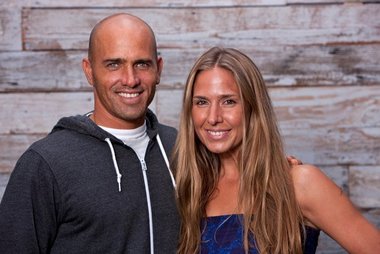
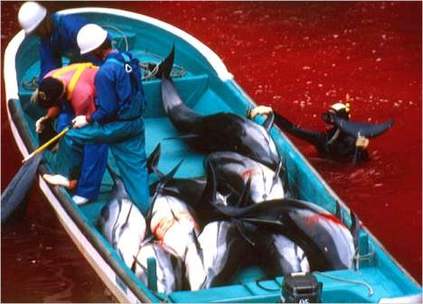
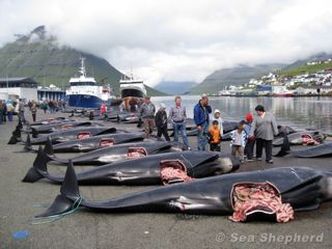
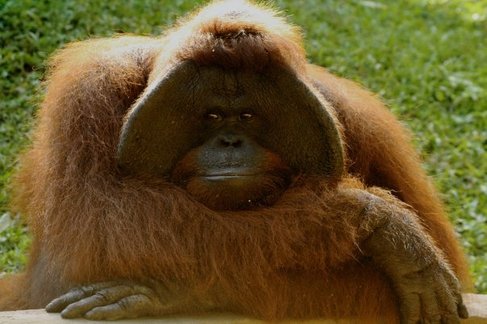

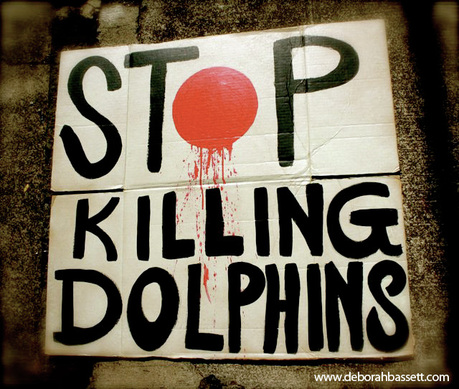
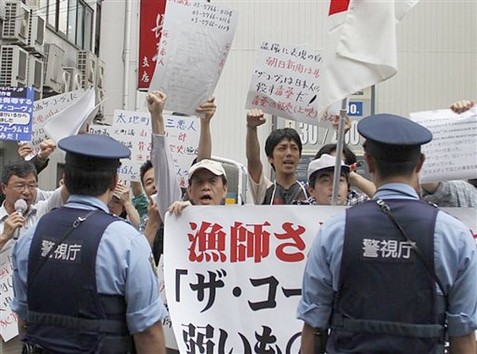
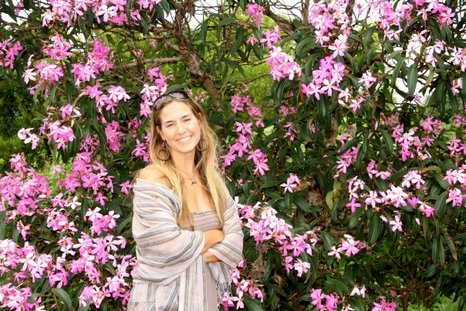
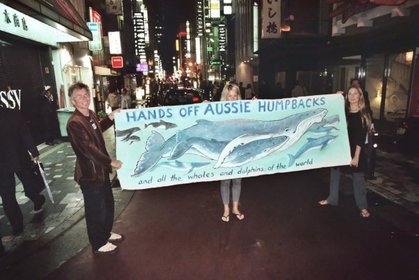
 RSS Feed
RSS Feed














